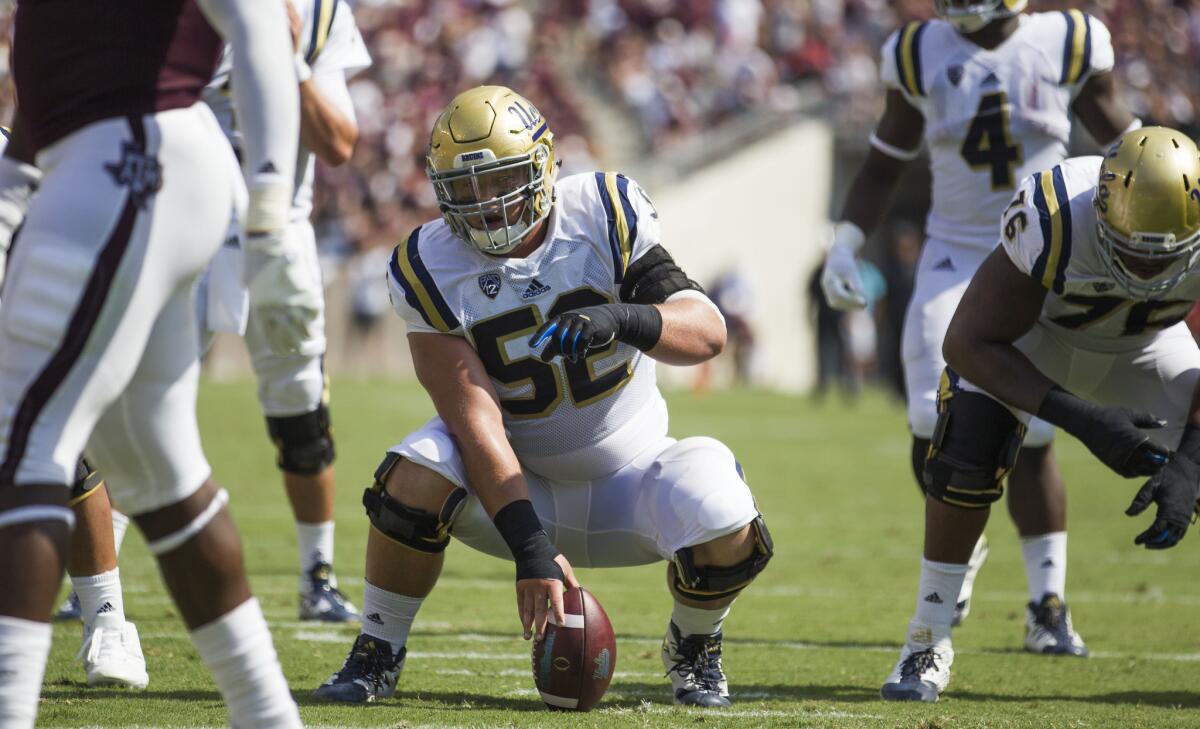Late-night games keep UCLA and other Pac-12 teams out of national spotlight

Recent UCLA football games have ended at a time that makes followup programming tricky. One possibility would be a midnight airing of “The Rocky Horror Picture Show.”
The Bruins’ games have nearly bled from one day into the next as they’ve become a staple of the late-night college football schedule.
UCLA’s game against Arizona on Saturday night at the Rose Bowl represented its second late start in three weeks, a trend that will continue Oct. 8 against Arizona State with another kickoff scheduled for 7:30 p.m. PDT.
Late night with the Bruins comes with one primary drawback.
“It just sucks for the conference, I think, because a lot of times the big games are played late at night and we don’t get the national attention that some of the other conferences that play at 1 o’clock or noon get,” UCLA center Scott Quessenberry said recently. “That’s really all it is. But in terms of playing late, in terms of mind-set, it doesn’t change anything.”
Bruins Coach Jim Mora has tried to alleviate restless legs by holding morning meetings, a walk-through and even some situational plays to give his team an idea of what it might face later that night. The mini-mock games are usually held in a hotel ballroom or on the sprawling lawn at the team’s Pasadena hotel.
“It’s just wherever we can find space,” Quessenberry said.
Mora leaves ample time for the viewing of other college football games to get his players in the proper mood for when they arrive at the stadium.
“I’m always watching football,” Quessenberry said. “Whenever I can pick up new things and find out situations and put myself in that situation on TV, it helps me for our game.”
Off target
The targeting rule has sparked such confusion that even the officials charged with clarifying the calls seem lost.
In the days following UCLA’s game against Stanford on Sept. 24, the Pac-12 Conference supported the ruling of the game and replay officials that UCLA defensive back Tahaan Goodman should not have been called for targeting despite delivering a helmet-to-helmet blow that left Stanford’s Francis Owusu with a concussion.
Upon reviewing the play, Pac-12 officials determined that “contact was with the front of the helmet and not the crown of the helmet.”
Um, not so much, the NCAA declared Friday.
“It seems that some officials have been interpreting the crown of the helmet to mean the tiptop portion of the helmet only,” said Rogers Redding, the association’s football secretary-rules editor. “We want everyone to understand that the crown of the helmet starts from the area above the face mask to the dome of the helmet.”
In other words, Goodman and the Bruins got away with one. Had Goodman been called for targeting on his first-half hit, he would have been ejected from the game.
Fight club
The Bruins have put a new spin on locker-room horseplay.
Quarterback Josh Rosen and offensive tackle Conor McDermott said in a conversation with The Players Tribune that teammates routinely engaged in fake fights.
“Like one guy pretends to jump another guy,” Rosen said. “Someone gets fake-punched, and that guy goes along with it and drops to the floor and acts like he’s knocked out.”
Said McDermott: “I don’t get it. At all.”
Said Rosen: “And it’s every day.”
Said McDermott: “It’s just crazy. I just stand there and watch … and take videos.”
Twitter: @latbbolch
More to Read
Go beyond the scoreboard
Get the latest on L.A.'s teams in the daily Sports Report newsletter.
You may occasionally receive promotional content from the Los Angeles Times.







